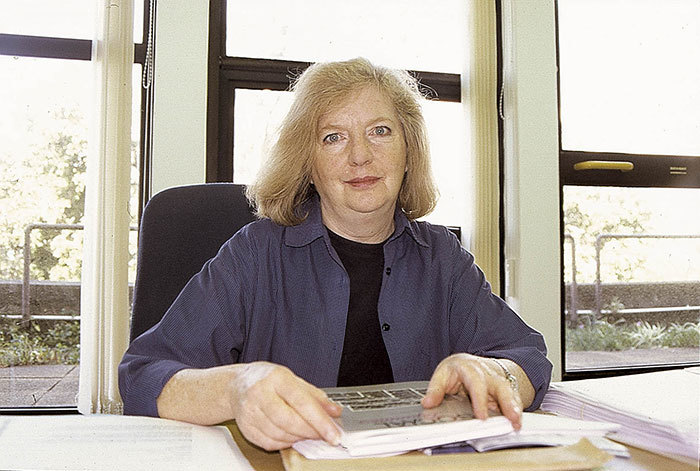Tribute to the late Prof Sandra Burman
28 January 2015 | Story by Newsroom
Professor Hugh Corder recently paid tribute to the late Emeritus Professor Sandra Burman on behalf of UCT and the Faculty of Law. Burman, who had spent the majority of her academic career in the faculty, passed away in January.
"Sandra was an extraordinary intellectual pioneer, despite huge obstacles, mainly emanating from the unusual nature of her work and a lack of funds and space; 'dogged determination' characterised all she did, against great odds.
"In reviewing Sandra Burman's file in preparation for this sad occasion, I was forcibly struck by how much the academic business has changed for the good. It is less rigid today, and would have been more accommodating of her endeavours, given the right leadership and vision. Sandra Burman lived in one sense at the wrong time."
Burman was a BA student at UCT from 1960-1962 (majoring in comparative African government and law, constitutional history, and law and political philosophy); she completed her LLB in 1964 and was admitted as an advocate. She went on to complete a BA at Oxford in 1968 (PPE), followed by a DPhil in 1974, focusing on the change in African customary law and society in late 19th century South Africa.
At Oxford, Burman's professional appointments included a stint at the Centre for Socio-legal Students associated with Wolfson College, working through the ranks as a research assistant, research officer, and senior research officer.
Burman returned to Cape Town and UCT in the early 1980s, while maintaining her Oxford links and appointments. In 1980-81 she worked with the Centre for Intergroup Studies – now known as the Centre for Conflict Resolution, and "headed [at the time] by the calm and indomitable Quaker, Professor HW van der Merwe, who attempted very quietly to bring together student leadership, Steve Biko and the Black Consciousness movement, and what remained of NUSAS in the 1970s, and who initiated some of the very first contact with the ANC in exile in Lusaka and beyond" – as a visiting research fellow.
She worked her way from temporary part-time lecturer in 1982 to being appointed full professor in the Centre for Socio-Legal Research in 1996, and she served in this capacity until her retirement in 2008.
Burman's research interests were varied. They included African customary law in the 1880s and the effects of Roman Dutch law on this system; compensation for illness and injury at work; the legal consequences of accidents in the home; the consequences of divorce (which led to Growing up in a Divided Society, co-edited with Professor Pamela Reynolds); and the history of illegitimacy in South Africa.
"All these themes fell within the area of socio-legal studies, an almost unknown subject in South Africa, which is why I referred to Sandra as a pioneer," said Corder. "She did not do much teaching in the formal sense, but her inaugural lecture on 23 October 1996 was a memorable occasion, titled: Luxury or necessity? Socio-legal studies for South Africa.
"Informally, Sandra Burman was a hugely important and successful teacher: she trained at least 50 research assistants in social science research methods, a lasting legacy," Corder said, quoting the dean of the time, Prof Dirk van Zyl-Smit:
"Dr Burman's interdisciplinary training in law and social science has provided the basis for an exceptional career as a researcher in the area of socio-legal studies. She has written eight books, some published by major publishers such as Oxford University Press and Macmillan. She has already produced 42 research papers and been the recipient of research grants from the HSRC and other local and international funders. Dr Burman has demonstrated qualities of leadership in the field of socio-legal research. She has trained a large number of research assistants (some forty in total) and is a much sought-after consultant. Both internationally and nationally, she is widely regarded as one of the top researchers on socio-legal matters, especially those relating to law and the family. There is no doubt that Dr Burman is eminently qualified to be an honorary principal research officer. She will add prestige to the Faculty of Law and to the university in this capacity."
That said, a battle for funding was a feature of Burman's tenure, said Corder.
"Almost as a product of her past, Sandra was always on the move, seeking a home. She oscillated annually between the two nodes that signified her life: three months in the northern summer in Oxford and surrounds, the remaining nine months in Cape Town.
"Sadly, in some ways, she did not find a permanent home: the Centre for Socio-Legal Research and Sandra Burman were so integrally connected that it was disbanded (when the HSRC withdrew all financial support) on her retirement. Happily many of her interests live on in the work of others, and in the lives and careers of those whom she trained."
Corder described Burman as a "collegial person, [who] always attended faculty occasions", and also as intensely private: "there was a limit to her collegiality, which everyone recognised".
"When, in 2007, signs of her illness were abundantly evident, and as dean I felt it my responsibility to ask her about her health, and whether she needed assistance, she gave nothing away, claiming that all was well, and I respected that," he said.
"Sandra Burman's death will be widely noted and mourned – in many places in Oxford, in Onati in the Basque country of northern Spain, the conference home of socio-legal studies, and in Cape Town, and among the intellectual community of socio-legal studies throughout the world, for whom Sandra was synonymous with that discipline in South Africa.
"She will live on in the work and lives of so many, research assistants and colleagues."
Story by staff reporter. Image supplied.
 This work is licensed under a Creative Commons Attribution-NoDerivatives 4.0 International License.
This work is licensed under a Creative Commons Attribution-NoDerivatives 4.0 International License.
Please view the republishing articles page for more information.










